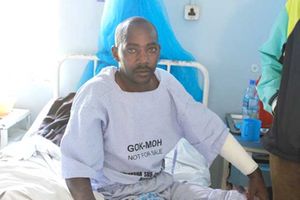Happening Now: Labour Day celebrations at Uhuru Gardens
Museveni sworn in as rival jets back

STEPHEN WANDERA | NATION
President Museveni (right) welcomes President Kibaki to his swearing in for a fourth elective term as Uganda’s president, at Kololo Airstrip, Kampala, on May 12, 2011. At the ceremony were several heads of state, including Zimbabwe’s Robert Mugabe.
What you need to know:
- President starts fourth term that will make him East Africa’s longest serving Head of State
Uganda’s President Yoweri Museveni was sworn in for a fourth term on Thursday as his rival Kizza Besigye returned home to a tumultuous welcome following medical care in Kenya after a police beating.
The 66-year-old Museveni, who has been in power since 1986, took the oath of office before thousands of supporters and the leaders of a host of African countries including Kenya, Tanzania and Zimbabwe.
Tens of thousands also turned out to welcome home Besigye, Museveni’s strongest challenger in the February 18 elections which the incumbent won comfortably but opposition groups said was fraudulent.
Police fired tear gas
Police twice fired tear gas to try to disperse the crowds gathered for the opposition leader, with one supporter carrying a placard reading: “Besigye must be sworn in as president today.”
Besigye said he was happy but not surprised by the scale of his welcome, which followed repeated security force crackdowns on anti-government protests that a rights group said killed at least nine people, some shot in the back.
“I am glad that people are becoming firm and facing down the brutality. That is the big change,” Besigye told AFP as he waved at crowds from the sunroof of a car that took him from the airport into Kampala.
“The people were discontented for a long time but now we are seeing this firmness,” he said.
Besigye, who has lost elections to Museveni three times in a row, flew in from neighbouring Kenya where he spent several days for treatment after being hurt by police during a protest last month.
His arm in a sling after a finger was struck by a police bullet, the Forum for Democratic Change party leader waved at an enthusiastic crowd that danced to blaring music, with the throng forcing his convoy to a walking pace.
The vehicles travelled with a police escort and were followed by supporters on motorcycles, with others lining the road in their thousands, cheering and waving greenery.
At one or two points on the 35-kilometre trip, police beat back people walking right next to Besigye’s car. Earlier they turned back motorbike taxis heading towards the airport to meet him.
Their response was however markedly more restrained than at all of Besigye’s other recent public appearances.
A military policeman accused by the crowd of firing live bullets at the opposition supporters was briefly pelted by a hail of stones before he was escorted away by police officers.
The veteran opposition leader, 55, last month embarked on a series of “walk to work” protests against soaring food and fuel prices which the opposition blames on the government.
He returned to the capital as Museveni took the oath at a ceremony at an airstrip in central Kampala that was followed by a gun salute.
“I, Yoweri Museveni, swear in the name of all-mighty God that I will be faithful, swear allegiance to the people and to the Republic of Uganda and that I will preserve and protect the Constitution, so help me God,” he said.
Besigye won 26 per cent of the vote in February’s election, the biggest challenge yet to Museveni.
His party questioned the official results, which gave 68 per cent of the vote to Museveni, alleging widespread fraud.
Museveni, a former guerrilla leader, told reporters on Tuesday that he planned to introduce constitutional amendments that would see bail prohibited for certain charges, including rioting and economic sabotage.
Opposition leaders, including Besigye, have been released on bail after they were arrested in the recent protests. Besigye has vowed to continue his protests despite the crackdown, including on April 28 when police smashed the windows of his car and sprayed him with tear gas. He went to Kenya the following day.




